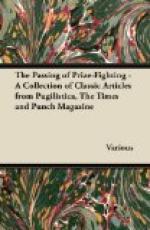In Douglas Jerrold (HODDER AND STOUGHTON) Mr. WALTER JERROLD has executed a pious task. He has written the life of his grandfather, and has done it with great enthusiasm. The work is in two volumes, one thick and the other thin, and sometimes I cannot help feeling that one volume, the thin one, would have been enough. DOUGLAS JERROLD’S reputation depends upon his work in Punch and his writing of plays, of which nearly seventy stand to his credit. To Punch he contributed from the second number and soon became a power by means of “Mrs. Caudle’s Curtain Lectures,” “The Story of a Feather” and countless other articles which suited the taste of the public of that day. Of his work for Punch there is only the barest mention in this book, for that story has already been told at some length by the same author. In the present book Mr. WALTER JERROLD devotes a large amount of space to a review of DOUGLAS JERROLD’S theatrical pieces. Where now is a five-act comedy, entitled Bubbles of the Day, which at the time of its production was described as “one of the wittiest and best constructed comedies in the English language”? I am afraid that this comedy, and even Black-eyed Susan, JERROLD’S greatest triumph, have passed away into the limbo of forgotten plays and can never return to us. Another drama had in it as one of the characters “a certain cowardly English traveller named Luckless Tramp,” a name, I should have thought, quite sufficient in itself to swamp every possible chance of success; yet our forefathers seem to have had no difficulty in accommodating themselves to it.
* * * * *
In an author’s note to Moon of Israel (MURRAY) Sir H. RIDER HAGGARD tells us that his book “suggests that the real Pharaoh of the Exodus was not Meneptah or Merenptah, son of Rameses the Great, but the mysterious usurper, Amenmeses ...” I am not a student of Egyptology, and in this little matter of AMENMESES am perfectly content to trust myself to Sir RIDER, and, provided that he tells a good tale, to follow him wherever he chooses to lead the way. And this story, put into the mouth of Ana, the scribe, is packed with mystery and magic and miracles and murder. For fear, however, that this may sound a little too exhausting for your taste, let me add that the main theme is the love of the Crown Prince of Egypt for the Israelite, Lady Merapi, Moon of Israel. Sir RIDER’S hand has lost none of its cunning, and, though his dialogue occasionally provokes a smile when one feels that seriousness is demanded, he is here as successful as ever in creating or, at any rate, in reproducing atmosphere. I hope, when you read this tale of the Pharaohs, that you will not find that your memory of the Book of Exodus is as faded as I found mine to be.
* * * * *




